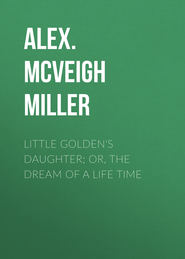По всем вопросам обращайтесь на: info@litportal.ru
(©) 2003-2024.
✖
Laurel Vane; or, The Girls' Conspiracy
Настройки чтения
Размер шрифта
Высота строк
Поля
Clarice looked frightened and disturbed, and even reproachful.
"Oh, Miss Gordon, don't say that," she exclaimed. "After all the drilling you've had, a clever, pretty girl like you ought to be able to act your part. But it's just as I told you to-day. You're too timid and nervous."
"Because I am conscious of my guilt," answered the girl, sadly. "I should not be timid and nervous in my own proper character, Clarice. But you know 'conscience makes cowards of us all.' Besides, I am ignorant on many subjects which Beatrix Gordon ought to know well. The people and places they ask me about I know nothing of, and they look surprised. To-day Mrs. Le Roy asked me to play on the piano. When I said I did not know how, I wish you could have seen their faces!"
"That was rather bad. The most of young ladies know how to play on the piano," said Clarice. "But anyhow they couldn't make out a case against you for that. You might have said that you didn't care for music."
"So I did, but the lie almost blistered my lips," said the girl, "for I love music dearly, and when Mr. Le Roy played a beautiful aria I was afraid he would see my delight on my face."
"You must be careful over that. Stick to your text," warned the maid. "If you make them think you don't like music they will not think it strange you cannot play. Was there anything else unpleasant?"
"Yes; Mrs. Le Roy told me I did not at all resemble my mother. Oh, I was so frightened when she began. My heart sprung to my lips!"
"What did you say?" asked Clarice, attentively.
"I told them I resembled my father—that was true at least," answered Beatrix, sighing.
"Well, the game is not lost yet," said Clarice. "Courage, Miss Gordon—hold your own bravely as you can. Remember all that is lost if you fail."
"I try to remember it," sighed the girl. "If it were not for her, Clarice, I should break down, I know I should. It is terrible to be living a lie. Oh, Clarice, do you think she is very happy now?"
"Happy as a queen," said Clarice, enthusiastically: "and she was so good and sweet she deserved it. Oh, you mustn't regret that you made a little sacrifice for her! And is it a sacrifice, after all? Look at this grand, beautiful home, all this luxury around you. Where would you be if my mistress hadn't sent you here?"
Where, indeed? The false Beatrix Gordon shivered as if with ague, her face blanched to a pallid hue. She thought of the homeless outcasts in the horrible streets, of the dark, flowing river, of St. Leon Le Roy's careless words to her that day: "I would throw myself into the river, and so end all!"
"I should not do that unless I were driven to desperation," said the girl to herself with unconscious bravery.
She looked through the window out upon the beautiful grounds.
"It is a lovely home," she said. "I could be very happy here if I had no shadow on my heart. But I cannot forget my sin. I remember always some lines that I have read:
'Some flowers of Eden we still inherit,
But the trail of the serpent is over them all.'"
"I would not call it a sin if I were you," said Clarice. "That is too harsh a name. My mistress did not call it so. She said it was only a justifiable counter plot, only a harmless, girl's conspiracy."
"She ought to know best. She is older and wiser than I am," said the girl, with a gleam of hope on her face.
Clarice was very clever for a girl in her situation. As she worked away steadily on the pink dress, she artfully followed up the impression her last words had made:
"For my part I think it is the best joke I ever heard of. I do not pity the Gordons one bit. They deserve to be fooled!" she said. "There was no fault in Miss Gordon's lover, only he was not as rich as she was."
"Poverty is almost a crime in the eyes of the rich—is it not?" asked her mistress thoughtfully.
"Yes," Clarice answered, almost tartly, and she began to hum under her breath:
"'Dollars and dimes, dollars and dimes,
An empty pocket is the worst of crimes!'"
Her young mistress remained gazing thoughtfully from the window, the sad expression of her face hidden by the falling waves of her golden hair. Deep, heavy sighs breathed at intervals over her lips.
Several days passed quietly without anything occurring to frighten our masquerading heroine again. The Le Roys gave no sign of their surprise at anything that occurred. They had, in fact, concluded that a great deal of her oddness and originality arose from the fact of the lover in the case. When she looked sad, as she often did, they concluded she was thinking of him. When St. Leon actually came upon her weeping silently one day he thought it was on account of the separation from our hero.
It vexed him. He did not go away and leave her alone, as his mother would have done. He said to her, sarcastically:
"Are you crying for your mamma, little girl?"
Beatrix flashed him a swift, angry look through her tears, and answered:
"No!"
"At least she has the grace to be honest," he said to himself.
Some curiosity came over him regarding the man who had won the heart of this girl. He would have liked to know his name, and what he looked like, and if he was worthy of the prize he had won.
"Confide in me, Miss Gordon," he said, obeying an impulse he could not himself understand. "Tell me what your trouble is. Perhaps I can help you."
Beatrix shuddered in horror. Ah, if he knew, how little he would be inclined to help her. Rather he would spurn her from the proud gates of Eden.
"You are very kind," she faltered. "I thank you, but it is nothing."
He looked at her a little scornfully.
"I have heard that women cry for nothing," he said. "I suppose it must be true, as I now hear it confirmed by one of the sex."
She seldom saw him except at meals, and a little while in the drawing-room of an evening. The most of his time was spent in the library or out riding and walking. But one day he came to her abruptly.
"I am going up to New York for a few days," he said. "I hope you will make use of my library while I am out of the way."
"Thank you," she said, radiantly.
"If I should see your parents," he continued, "shall I give them any message for you?"
She started, and the crimson rose she was holding fell from her hands. He wondered why she grew so deadly pale, and trembled so. The sudden radiance of a moment ago had all gone from her face.
"Give them my love," she said in a husky voice, "and tell them—tell them that I am greatly enjoying my visit to Eden."
CHAPTER VIII
St. Leon came home one afternoon and made his way straight to the library. The thickly carpeted floor gave back no echo to his footfalls, and he stood on the threshold of the room several minutes gazing in at the open door unobserved by the single occupant of the apartment.
As he had shrewdly suspected, his mother's guest had availed herself to the full of his permission to use the library in his absence.
Quite oblivious of his near presence now, Beatrix was curled up in his great easy-chair in a cozy, kittenish attitude, her warm flushed cheek buried in the hollow of one small hand, her dark eyes bent in rapt interest on an open book in her lap. A ray of sunshine stealing through the lace curtains at the window penciled golden bars on her white dress and bright hair, making her look like a picture to whose beauty St. Leon's cultured eyes were by no means oblivious. He hesitated to startle her from her pretty negligent attitude, but as he gazed his mesmeric eyes irresistibly attracted hers. She glanced up and met his dark, burning eyes fixed with a strange inscrutable expression upon her own.
Instantly Beatrix sprung up, the book falling to the floor, a little cry of surprise on her lips, her face paling, a look of inexplicable terror in her dark eyes.
"Am I an ogre that you do me the honor to be frightened at me, Miss Gordon?" he inquired, advancing into the room, a tone of displeasure in his deep, musical voice.











